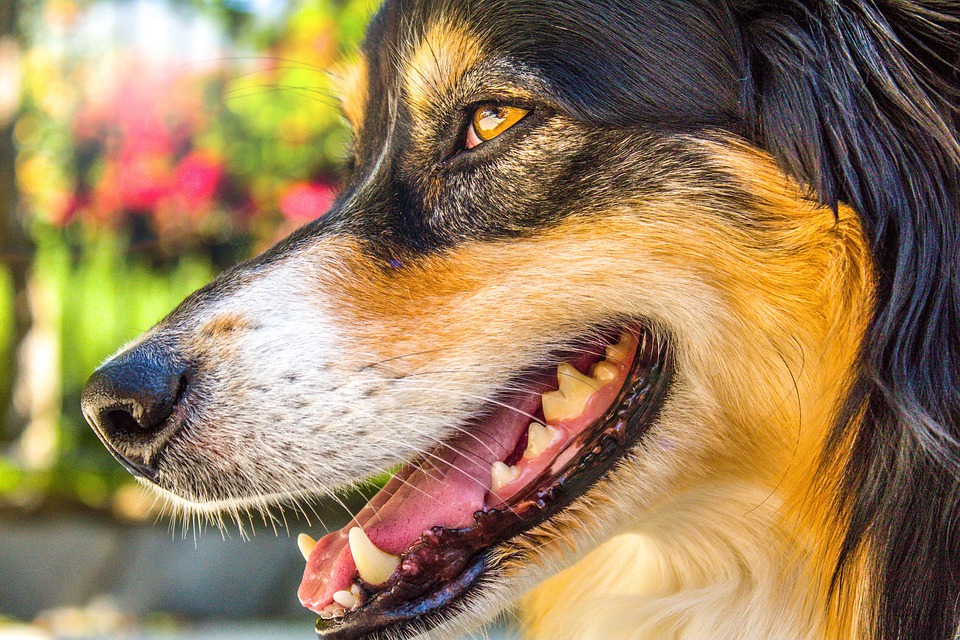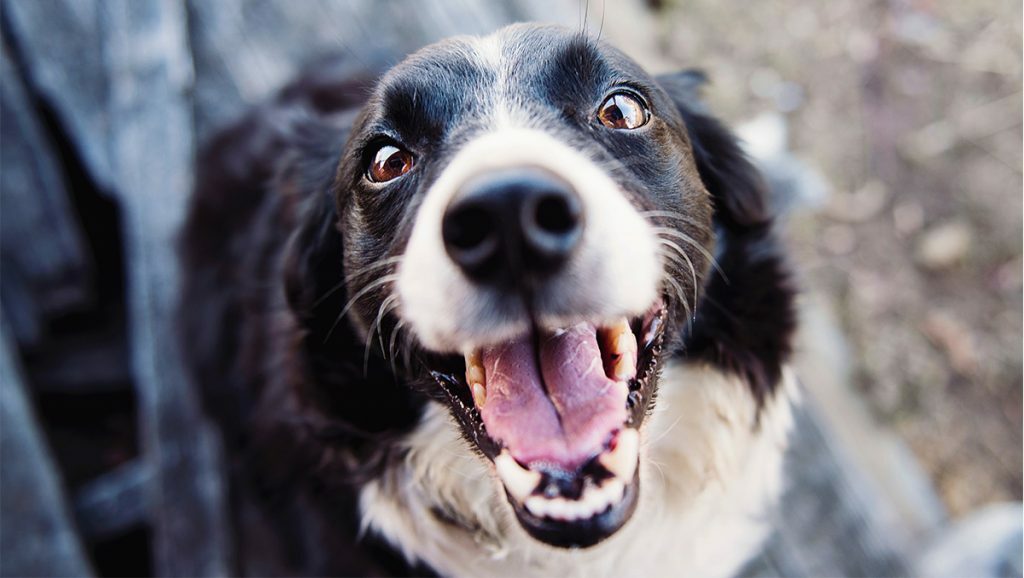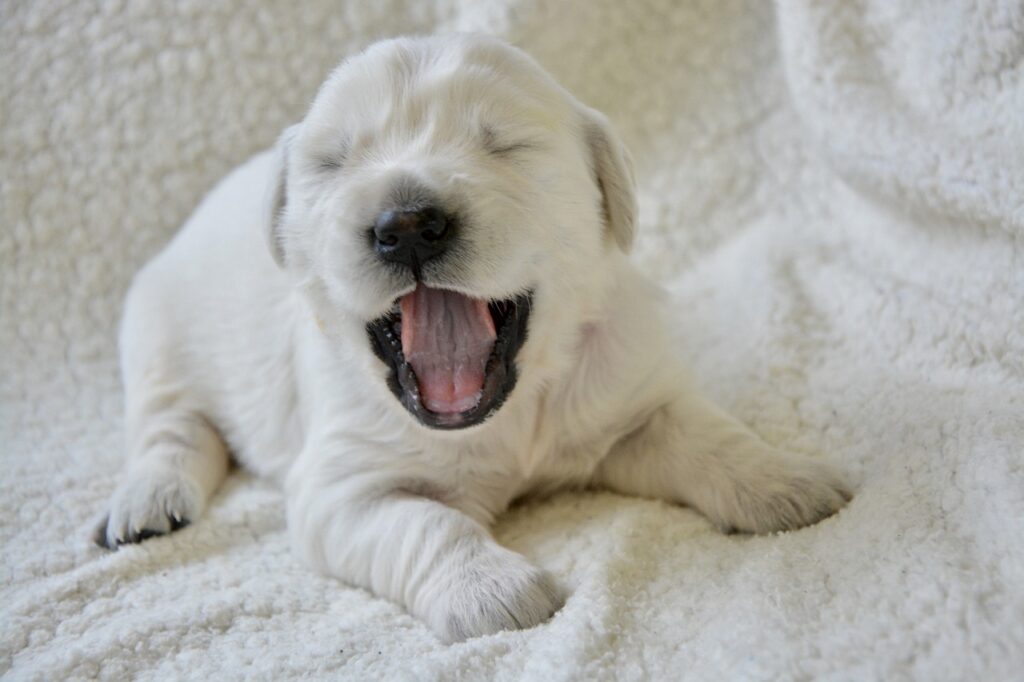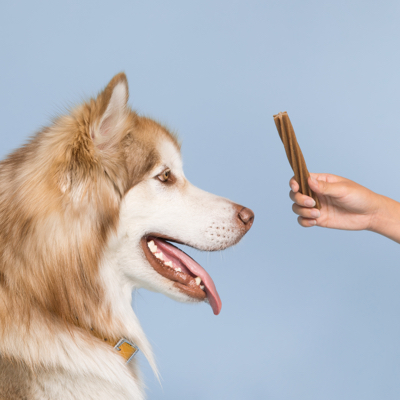Dental disease is the most common problem vets diagnose in dogs over the age of three. Because our furry friends explore the world with their mouths, your dog’s dental health is important – that means keeping their teeth and gums in tip top shape.
Dogs are just as vulnerable to dental problems as we are. Which is why their mouths need the same amount of care and attention as we give our own. Since our dogs can’t look after their teeth themselves, it’s up to us to keep our pup’s teeth and gums healthy.
How to look after your dog’s teeth

Daily brushing is the best way to prevent dental problems in dogs. Without brushing, plaque and tartar will build up on the surface of the teeth. This can cause inflammation of the gums; painful cavities and their teeth can become loose and fall out. At a minimum, brushing your dog’s teeth every day should be adequate to keep the dog bad breath and gum disease at bay.
Alongside brushing, there are additional ways to help keep your dog’s teeth clean and healthy:
Kibble in general is a natural abrasive due to its texture and can help towards maintaining good dental health. This is something worth considering when you’re considering whether to feed dry or wet food.
Feeding a daily dental chew can also help reduce plaque. If you decide to use dental chews, make sure you buy the right size for your dog to maintain a health, balanced diet. And be sure to reduce your dog’s normal food intake so they don’t gain weight.
There are enzymatic products on the market that you add to your dog’s water bowl that claim to fight bad breath and plaque build-up. Knowing what will work for your dog can be a challenge, so it’s always best to speak with your vet and get recommendations.
These are all great options to use alongside a daily brushing routine. But if you don’t brush your dog’s teeth regularly, it’s more likely they’ll need a procedure under anaesthetic at the vets. Which could mean anything from a thorough scale and polish, to multiple tooth extractions.
How to brush your dog’s teeth

To clean your dog’s teeth, you’ll need a toothbrush and toothpaste that’s made for our canine friends. Never use human toothpaste as it contains fluoride, which is poisonous to dogs. As with any new experience, take it slowly and reward your dog when they’re calm and relaxed.
- Get your dog used to you being around their mouth. Gently lift up their lips and reward them when they’re sitting calmly. Do this a few times a day for a couple of days.
- Put a small amount of toothpaste on your finger and let your dog lick it off. Most dog toothpastes have a meaty flavour and they’ll likely enjoy the taste.
- Then, with toothpaste on your finger, start to run your finger along your dog’s teeth.
- When your dog is comfortable with your finger in their mouth, introduce the toothbrush.
- Use circular motions, ensuring you’re at a 45 degree angle so you massage the gum line in the process.
- Start on the front teeth first and work your way towards the back. Be sure to stop occasionally and let your dog lick the toothbrush so they’re always rewarded.
Build this into a daily routine and your dog will soon get used to having their teeth brushed regularly. It can even become an activity you both enjoy and bond over. Ideally you should brush your dog’s teeth for two minutes at a time. But if at any point you can see they’re becoming stressed or agitated, stop and try again next time.
Bad breath

Many of us love a good snuggle with our pooch, but it’s not always the dreamy cuddle you imagined if they have stinky dog breath.
There are many causes of bad breath in dogs, but the most common reason is not brushing your dog’s teeth often enough. When you don’t brush your dog’s teeth, plaque, tartar and bacteria build up in the mouth, all of which can cause bad breath.
If your dog’s mouth has a particularly strong and foul odour, this could be caused by an abscess or infection. Dogs can also get bad breath after they’ve groomed and licked their private areas and the smell transfers. Less common reasons for bad breath include diabetes, sinusitis and eating poop, or otherwise known as coprophagia.
Dog losing teeth

Just like humans, it’s normal for puppies to lose their baby teeth. However, exactly when puppies lose their teeth usually depends on the breed. Because smaller dogs grow faster than larger breeds, their teeth fall out quicker. But in a general sense, most puppies start losing their teeth anywhere between 14-30 weeks old.
Most puppies will swallow their teeth without realising during play or while eating. This is perfectly normal and nothing to worry about. Sometimes young dogs will retain a few teeth and this can cause overcrowding. It’s often the canine teeth on the upper jaw that can be a little stubborn. If you notice any of your dog’s baby teeth are refusing to budge, book an appointment to see your vet.
In older dogs, losing teeth is a sign your dog has advanced stage dental disease. This can be extremely painful for your dog, even if they’re not showing signs of discomfort. Dogs are very good at hiding their pain. If your older dog is losing their teeth, seek veterinary help as soon as possible. Advanced dental disease puts your dog at risk of other diseases, as the bacteria can cause inflammation and problems elsewhere in the body.
Dog teeth chattering
Dog teeth chattering could be as simple as over-excitement, anxiety, or a more serious condition. You might notice the behaviour if your dog is excited by a new ball, or they’re nervous of a new visitor. It can also simply be a sign your dog is cold. Just like we shiver and our teeth chatter when we feel a chill.
However, the most common cause of chattering is oral pain. Which means your pooch may have problems with their gums and teeth. If your dog’s teeth chattering is a new behaviour, always get them checked over by a vet.
Dog grinding teeth
Just like teeth chattering, dogs commonly grind their teeth when they’re experiencing pain. Also known as bruxism, teeth grinding should be discussed with your vet as it can wear down the enamel. This can then lead to more serious issues like painful teeth and gums, fractures, tooth infections and exposed pulp. Dog teeth grinding can also be caused by stress.
Gum disease in dogs

Unfortunately, gum disease in dogs is the most common condition diagnosed by vets. Four out of five dogs over three develop the problem, which is why your dog’s dental care is so important. Gum disease in dogs is commonly recognised by bad breath, yellow or brown staining on your dog’s teeth, and red, inflamed gums.
When plaque and bacteria build up on the surface of the teeth, this forms a hardened layer of tartar. And when the build up of plaque and bacteria becomes severe, this can cause deep infection and progress to periodontal disease. This then leads to teeth becoming loose and falling out.
Dog dental chews

Dog dental chews are a great way to help reduce plaque and tartar build up that causes gum disease. And our Dental Dailies are the ideal solution to include in your dog’s daily dental routine alongside brushing.
Our dog dental chews are star shaped and made with pumice to scrub away in between crevices for cleaner teeth. And as with all our tailored foods, our chews contain no artificial flavourings, colours or added sugars. Why not add a couple of packets to your order for fresher breath and a healthier smile from your beloved pooch.


We have a Jack Russell terrier who is 16 years old but still very lively for his age. His breath smells and when he relaxes in his basket he sometimes cos his lips. He has regular exercise and dental stick each day together with his dry food but we don’t clean his teeth.
Hi could you tell me whst Kibble is please.
Kind regards Alan worgan
Hi Alan,
Kibble is another word for dry dog food.
Millie
If fluoride is deadly to dogs what about the water we give them. As I understand it fluoride is added to our drinking water.
Hi Pauline,
Dogs are sensitive to fluoride in high concentrations. The amount of fluoride added to drinking water is very low in comparison to the amount that’s in human toothpaste. It’s worth bearing in mind that although we spit toothpaste out after brushing, dogs will almost always swallow whatever is in their mouth – so it’s best to avoid human toothpastes to make sure they don’t ingest too much fluoride.
If you are concerned, it’s best to have a chat to your vet as they’re best qualified to help.
Millie